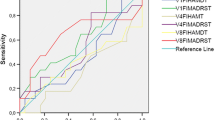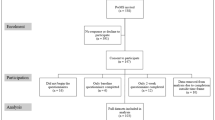Abstract
Measuring depression in patients with chronic illnesses such as multiple sclerosis (MS) is potentially complicated by the fact that several somatic symptoms of depression are also common in chronic illnesses. Whether standard assessment measures such as the Beck Depression Inventory (BDI) and Hamilton Rating Scale for Depression (HRSD) should exclude certain somatic symptoms when used in MS has been examined previously, but there is no clear consensus on this issue. The present study evaluated the utility of individual BDI and HRSD items for assessing depression in MS patients by examining how individual items responded to depression treatment in 42 (29 female) depressed MS patients. All 21 BDI items and 12 of 17 HRSD items decreased significantly with treatment, suggesting that all BDI items tap depression, as do 12 of 17 HRSD items. Thus, the present data support the inclusion of all BDI items when measuring depression in MS. Decisions on whether or not to use all HRSD items or only the 12 shown here to capture depression may depend on the study purpose and design.
Similar content being viewed by others
References
Aikens, J. E., Reinecke, M. A., Pliskin, N. H., Fischer, J. S., Wiebe, J. S., McCracken, L. M., and Taylor, J. L. (1999). Assessing depressive symptoms in multiple sclerosis: Is it necessary to omit items from the original Beck Depression Inventory ? J. Behav. Med. 22: 127–142.
Barnwell, A. M., and Kavanaugh, D. J. (1997). Prediction of psychological adjustment to multiple scleorsis. Soc. Sci. Med. 45: 411–418.
Beck, A. T., Ward, C. H., Medelson, M., Mock, J., and Erbaugh, J. (1961). An inventory for measuring depression. Arch. Gen. Psychiatry 4: 561–571.
Beck, A. T., Steer, R. A., and Garbin, M. G. (1988). Psychometric properties of the Beck Depression Inventory: Twenty-five years of evaluation. Clin. Psychol. Rev. 8: 77–100.
Cassem, E. H. (1995). Depressive disorders in the medically ill: An overview. Psychosomatics 36: 2–10.
Cohen-Cole, S.A., and Harpe, C. (1987). Diagnostic assessment of depression in the medically ill. In Stoudemire, A., and Fogel, B. S. (Eds.), Principles of medical psychiatry, Grune and Stratton, New York, pp. 23–36.
Cohen, J. (1988). Statistical Power Analysis for the Behavioral Sciences, 2nd ed., Hillsdale, Erlbaum, New Jersey.
Dantzer, R. (2001). Cytokine-induced sickness behavior: Mechanisms and implications. Ann. N. Y. Acad. Sci. 933: 222–234.
First, M. B., Spitzer, R. L., Gibbon, M., and Williams, J. B. (1995). Structured Clinical Interview for DSM-IV Axis I Disorders-Patient Edition (SCID-I/P, Version 2.0). New York State Psychiatric Institute, New York.
Geisser, M. E., Roth, R. S., and Robinson, M. E. (1997). Assessing depression among persons with chronic pain using the Center for Epidemiological Studies-Depression Scale and the Beck Depression Inventory: A comparative analysis. Clin. J. Pain 13: 153–170.
Gilchrist, A. C., and Creed, F. H. (1994). Depression, cognitive impairment and social stress in multiple sclerosis. J. Psychosomatic Med. 38, 193–201.
Goodkin, D. E. (1992). The natural history of multiple sclerosis. In Rudick, R. A., and Goodkin, G. E. (Eds.), Treatment of Multiple Sclerosis: Trial Design, Results, and Future Perspectives, Springer-Verlag, New York, pp. 17–46.
Gulick, E. E. (1997). Correlates of quality of life among persons with multiple sclerosis. Nurs. Res. 46: 305–311.
Hamilton, M. (1960). A rating scale for depression. J. Neurol. Neurosurg. Psychiatry 23: 56–62.
Hays, R. D., Marshall, G. N., Wang, E. Y. I., and Sherbourne, C. D. (1994). Four-year cross-lagged associations between physical and mental health in the medical outcomes study. J. Consulting Clin. Psychol. 62: 441–449.
Huber, S. J., Rammohan, K. W., Bornstein, R. A., and Christy, J. A. (1993). Depressive symptoms are not influenced by severity of multiple sclerosis. Neuropsychiatry Neuropsychol. Behav. Neurol. 6: 177–180.
Joffe, R. T., Lippert, G. P., Gray, T. A., Sawa, G., and Horvath, Z. (1987). Mood disorder and multiple sclerosis. Arch. Neurol. 44: 376–378.
Kathol, R. G., and Petty, F. (1981). Relationship of depression to medical illness: A critical review. J. Affect. Disor. 3: 111–121.
Katon, W., and Sullivan, M. D. (1990) Depression and chronic medical illness. J. Clin. Psychiatry 56: 3–11.
Koenig, H. G., George, L. K., Peterson, B. L., and Pieper, C. F. (1997). Depression in medically ill hospitalized older adults: Prevalence, characteristics, and course of symptoms according to six diagnostic schemes. Am. J. Psychiatry 154: 1376–1383.
Leventhal, E. A., Hansell, S., Diefenbach, M., Leventhal, H., and Glass, D. C. (1996). Negative affect and self-report of physical symptoms: Two longitudinal studies of older adults. Health Psychol. 15: 193–199.
Lublin, F. D., and Reingold, S. C. (1996). Defining the clinical course of multiple sclerosis: Results of an international survey. Neurology 46: 907–911.
Lustman, P. J., Clouse, R. E., Griffith, L. S., Carney, R. M., and Freedland, K. E. (1997). Screening for depression in diabetes using the Beck Depression Inventory. Psychosom. Med. 59: 24–31.
Minden, S. L., Orav, J., and Reich, P. (1987). Depression in multiple sclerosis. Gen. Hosp. Psychiatry. 9: 426–434.
Mohr, D. C., and Dick, L. P. (1998). Multiple sclerosis. In Camic, P. M., and Knight, S. (Eds.), Clinical Handbook of Health Psychology: A Practical Guide to Effective Interventions, Hogrefe and Huber, Seattle, pp. 313–348.
Mohr, D. C., Goodkin, D. E., Gatto, N., and Vander Wende (1997a). Depression, coping and level of neurological impairment in multiple sclerosis. Mult. Scler. 3: 254–258.
Mohr, D. C., Goodkin, D. E., Likosky, W., Beutler, L., Gatto, N., and Langan, M. K. (1997b). Identification of Beck Depression Inventory items related to multiple sclerosis. J. Behav. Med. 20: 405–412.
Mohr, D. C., Boudewyn, A. C., Goodkin, D. E., Bostrom, A., and Epstein, L. (2001a). Comparative outcomes for individual cognitive-behavior therapy, supportive-expressive group psychotherapy, and sertraline for the treatment of depression in multiple sclerosis. J. Consulting Clin. Psychol. 69: 942–949.
Mohr, D. C., Goodkin, D. E., Islar, J., Hauser, S. L., and Genain, C. P. (2001b) Treatment of depression is associated with suppression of nonspecific and antigen-specific T(H)1 responses in multiple sclerosis. Arch. Neurol. 58(7): 1081–1086.
Noseworthy, J. H., Lucchinetti, C., Rodriguez, M., and Weinshenker, B. G. (2000). Multiple sclerosis. N. Eng. J. Med. 343: 938–952.
Nyenhuis, D. L., Rao, S. M., Zajecka, J. M., Luchetta, T., Bernardin, L., and Garron, D. C. (1995). Mood disturbance versus other symptoms of depression in multiple sclerosis. JINS, 291–296.
Pakenham, K. I. (1999). Adjustment to multiple sclerosis: Application of a stress and coping model. Health Psychol. 18: 383–392.
Poser, C. M., Paty, D. W., Scheinberg, L., McDonald, W. I., Davis, F. A., Ebers, G. C., Johnson, K. P., Sibley, K. P., Silberberg, D. H., and Tourtellotte, W. W. (1983). New diagnostic criteria for multiple sclerosis. Ann. Neurol. 13: 227–231.
Robertson, M. M., and Katona, C. L. E. (1997). Depression and Physical Illness. Wiley, Chichester.
Rodin, R., Craven, J., and Littlefield, C. (1991). Depression in the Medically Ill: An Integrated Approach, Brunner/Mazel, New York.
Sadovnick, A. D., Eisen, K., Ebers, B. C., and Paty, D. W. (1991). Cause of death in patients attending multiple sclerosis clinics. Neurology 41: 1193–1196.
Salovey, P., and Birnbaum, D. (1989). Influence of mood on health-relevant cognitions. J. Pers. Soc. Psychol. 57: 539–551.
von Ammon Cavanaugh, S. (1995). Depression in the medically ill: Critical issues in diagnostic assessment. Psychosomatics 36: 48–59.
Whisman, M. A., Strosah, K., Fruzzetti, A. E., Schmaling, K. B., Jabobson, N. S., and Miller, D. M. (1989). A structured interview version of the Hamilton Rating Scale for Depression: Reliability and validity. Psychol. Assess. 1: 238–241.
Author information
Authors and Affiliations
Corresponding author
Rights and permissions
About this article
Cite this article
Moran, P.J., Mohr, D.C. The Validity of Beck Depression Inventory and Hamilton Rating Scale for Depression Items in the Assessment of Depression Among Patients with Multiple Sclerosis. J Behav Med 28, 35–41 (2005). https://doi.org/10.1007/s10865-005-2561-0
Accepted:
Issue Date:
DOI: https://doi.org/10.1007/s10865-005-2561-0




